Curso
Cuando estás buscando un nuevo trabajo, uno de tus primeros pensamientos puede ser: ¿Cuánto me van a pagar? Si estás buscando oportunidades como analista de negocios, hay una gran cantidad de puestos disponibles y los salarios de los analistas de negocios suelen ser bastante competitivos.
La Oficina de Estadísticas Laborales de EE. UU. prevé que la demanda aumentará un 11 % entre 2023 y 2033, por encima de la media de todas las profesiones. Los analistas de negocios ya tienen una gran demanda, y parece que esta demanda solo aumentará con el tiempo.
Tal y como analizamos en el Informe sobre el estado de los conocimientos sobre datos e inteligencia artificial 2025, los recientes avances en materia de datos e inteligencia artificial han catalizado la revolución digital, lo que constituye un factor importante que impulsa la demanda de analistas de negocios. Gracias a la creciente necesidad de comprender los datos, todo tipo de industrias están creando equipos y departamentos de analistas de datos para crecer con la revolución digital.
Sin embargo, hay escasez de candidatos con conocimientos analíticos para desempeñar esas funciones, una escasez de Entre 140 000 y 190 000 personas padecen la enfermedad de E, solo en Estados Unidos. La gran demanda de analistas coloca a los analistas de negocios en una buena posición para ganar un sueldo considerable, competitivo entre otras carreras tecnológicas.
Los analistas de negocios apoyan muchas funciones de una empresa, y sus salarios pueden variar en función de su puesto específico, sus habilidades, su nivel de experiencia, su ubicación e incluso el sector en el que trabajan.
Este artículo analizará cómo estos criterios influirán en el salario de un analista de negocios en 2026. Hemos basado nuestro análisis en datos de varios portales de empleo, entre ellos Glassdoor y PayScale, así como en datos públicos de Estados Unidos. Oficina de Estadísticas Laborales y encuestas sobre el empleo. Este enfoque abarcará Estados Unidos, Reino Unido, Unión Europea y Canadá para ofrecerte información detallada independientemente de dónde te encuentres.
Salarios de los analistas de negocios según la experiencia
Veamos primero cuánto ganan los analistas de negocios en función de su nivel de experiencia.
Salarios medios de los analistas de negocios
¿Cuánto gana de media un analista de negocios? Según Indeed, el salario medio total de los analistas de negocios en Estados Unidos es de 85 723 dólares al año. La estimación de confianza de esta cifra es alta, y se ha basado en más de 8000 salarios declarados.
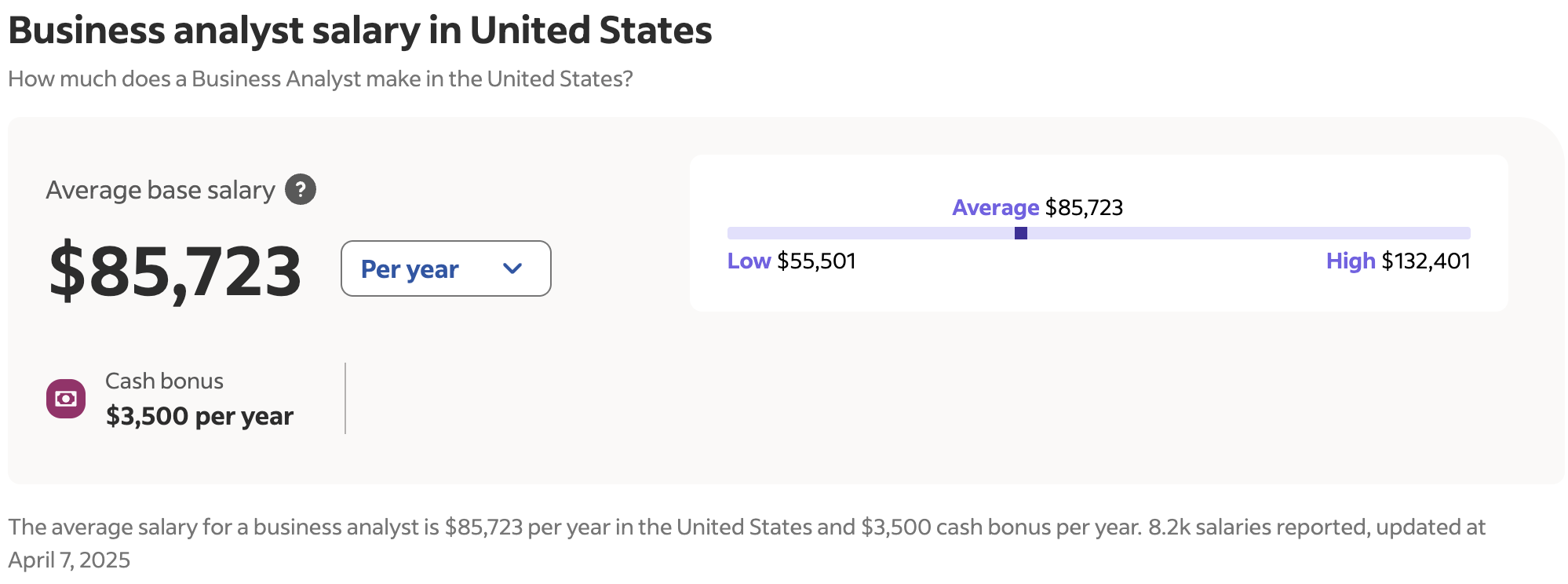 Fuente de la imagen: Efectivamente
Fuente de la imagen: Efectivamente
Salarios iniciales de los analistas de negocios
Sin embargo, el salario de un analista de negocios variará en función de la experiencia. Centrándonos en Estados Unidos, podemos ver que, como persona que se inicia en el campo del análisis empresarial, puedes esperar ganar alrededor de 55 501 dólares al año.
Salarios de los analistas empresariales sénior
En cambio, si eres analista empresarial sénior, tu experiencia te garantiza un salario medio anual de 132 401 dólares. Es evidente que la remuneración de los analistas de negocios aumenta de forma fiable con la antigüedad.
Fuente de la imagen: Escala salarial
Al observar este gráfico de PayScale, podemos ver un informe más detallado de cómo los años de experiencia afectan directamente al nivel salarial. Con sus datos, los analistas de negocios principiantes pueden esperar ganar 65 000 dólares, mientras que, con 20 años de experiencia o más, ese salario puede aumentar hasta los 97 000 dólares. Estas cifras se basan en una muestra más pequeña que la de Glassdoor, lo que podría explicar la diferencia que hemos observado.
Salarios de los analistas de negocios por ubicación
La ubicación es otra variable que modificará tus ingresos previstos. Veamos el desglose de estas áreas:
Salarios de los analistas de negocios en Estados Unidos
Según los datos recopilados por Zippia, los analistas de negocios ganan más en Washington, California, New Hampshire, Nueva Jersey y Oregón. En Washington, que es donde mejor se paga, el salario medio de un analista de negocios es de 88 037 dólares, lo que supone un descenso con respecto a 2022, cuando era de 93 191 dólares. Mientras que Florida tiene uno de los salarios medios más bajos para los analistas de negocios, con 61 057 dólares, que sigue siendo superior al salario anual nacional en todos los puestos y sectores.

Fuente de la imagen: Zippia. Las zonas más oscuras del mapa muestran dónde ganan más los analistas de negocios en los 50 estados.
Salarios de los analistas de negocios en el Reino Unido
En el Reino Unido, el salario medio de un licenciado universitario es de 42 000 £, menos que el salario base de un analista en Estados Unidos. Además, la trayectoria salarial de un licenciado universitario no es una curva ascendente tan estable en el Reino Unido.
Hay poca diferencia en el salario de un licenciado sin experiencia hasta que se convierte en analista sénior, momento en el que puede ganar alrededor de 71 000 £ al año. Esto supone una mejora, pero no es tan competitivo como los salarios estadounidenses.
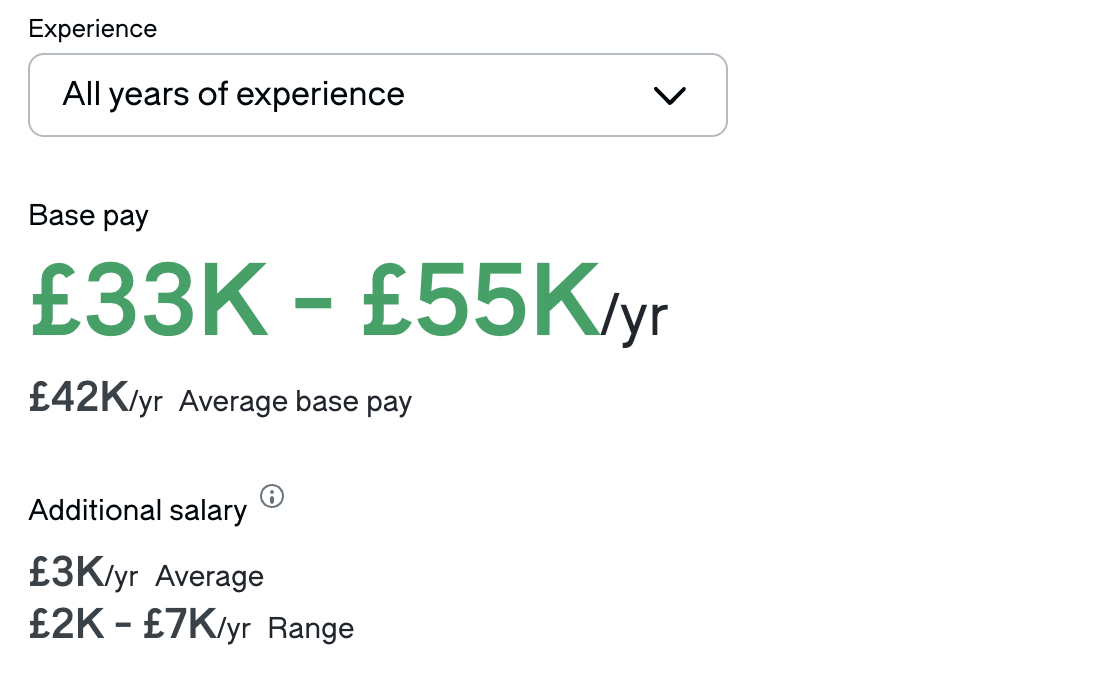
Fuente de la imagen: Glassdoor
Salarios de los analistas de negocios en la Unión Europea
Con 27 países en la UE, hay un amplio margen para una gran variedad de salarios. A continuación, te ofrecemos algunos ejemplos que ilustran la variedad salarial existente en Europa.
Uno de los lugares más lucrativos de la UE para ser analista de negocios es Alemania. De media, un licenciado en Alemania puede esperar ganar alrededor de 55 000 € al año, lo que se considera un salario medio. Como analista de negocios sénior, el salario medio anual asciende a 77 008 €.
Del mismo modo, en Ámsterdam y los Países Bajos, puedes esperar un salario base de 52 645 €, que aumenta hasta los 71 603 € como analista sénior.
En Francia, el salario base medio es ligeramente inferior, con 42 308 € al año, y hay poca diferencia en la tarifa para los candidatos sin experiencia. Otras zonas del Mediterráneo, como España e Italia, tienen un salario considerablemente más bajo para los analistas de negocios. De media, tu salario en España sería de 32 868 € y en Italia de 27 500 €.
Salarios de los analistas de negocios en Canadá

Fuente de la imagen: Efectivamente
Canadá, al igual que Estados Unidos, puede ofrecer un salario generoso a los analistas de negocios. En promedio, esto parece ser alrededor de 73 702 dólares.
Salarios de los analistas de negocios por puesto de trabajo
«Analista de negocios» es un puesto de trabajo que abarca muchos tipos de funciones diferentes, desde analista de negocios junior de TI hasta analista de inteligencia de negocios. A continuación, desglosamos el salario medio de algunos de los puestos que entran dentro de la categoría de BA, con una diferencia de alrededor de 30 000 dólares entre los puestos mejor y peor remunerados.
La antigüedad y la implicación en el ámbito tecnológico de un analista de negocios suelen traducirse en una remuneración más elevada. (Datos sobre puestos de trabajo en Estados Unidos, según Payscale).
Salarios de los analistas de gestión empresarial
Proporciona conocimientos analíticos de alto nivel para el desarrollo de soluciones complejas de informes y análisis de inteligencia empresarial (BI) utilizando diversas herramientas, como Oracle. Debes tener una sólida experiencia en gestión y análisis.
Salario medio: 75 038 $.
Salarios de los analistas de rendimiento empresarial
Evalúa el rendimiento de los sistemas y los resultados. Gracias a sus sólidas habilidades analíticas y de investigación, un analista de rendimiento trabaja con distintos equipos y con los directivos para optimizar el crecimiento de los clientes.
Salario medio: 60 678 $.
Salarios de analista de negocios II
Recopilar y analizar datos para una posible expansión del negocio. Un analista de negocios II deberá dominar las estadísticas, estar certificado en programas como SQL y ser capaz de asumir funciones de liderazgo.
Salario medio: 64 981 $.
Salarios de los analistas de inteligencia empresarial
Combina tu capacidad técnica con tu visión para los negocios a fin de proporcionar información valiosa sobre las fuerzas impulsoras que hay detrás de cada aspecto del negocio. Realizar análisis de la competencia y del sector para garantizar la viabilidad a largo plazo del negocio. Los analistas de BI deben tener experiencia en una amplia gama de habilidades, entre las que se incluyen la estadística, la visualización y gestión de datos, la programación informática y muchas más. Muchas empresas exigirán que los analistas de BI principiantes tengan varios años de experiencia como analistas de datos o en puestos relacionados.
Salario medio: 66 791 dólares.
Salarios de los analistas de negocios de aplicaciones
Formar parte del equipo de TI de una organización, desempeñando una función analítica para garantizar que los sistemas de aplicaciones informáticas que se utilizan satisfacen las necesidades de la organización. Los analistas de aplicaciones deben tener conocimientos técnicos, incluyendo el dominio de los lenguajes informáticos.
Salario medio: 66 882 $.
Salarios de los analistas técnicos de negocios
Supervisa e implementa proyectos y soluciones técnicas. El objetivo principal es convertir los requisitos empresariales en especificaciones técnicas que sean fácilmente comprensibles para los equipos técnicos y de desarrollo. Para ello, se requieren más de tres años de experiencia en análisis de datos, así como conocimientos sobre herramientas de BI y lenguajes de programación.
Salario medio: 71 489 $.
Salarios de los analistas de negocios ágiles
Proporciona orientación y asesoramiento a diversas líneas de negocio sobre el uso de diversas herramientas y procesos de gestión de datos. A menudo se requiere un par de años de experiencia en modelado de casos y una sólida experiencia en Agile y Scrum.
Salario medio: 74 000 dólares.
Salarios de los analistas de soluciones empresariales
Aporta liderazgo y experiencia en tecnologías líderes del sector, herramientas de generación de informes, metodologías de gestión de datos, infraestructura y mejores prácticas en entornos basados en la ciencia de datos. Este puesto requiere varios años de experiencia en soluciones financieras.
Salario medio: 75 243 $.
Salarios de los analistas de sistemas empresariales
Ayuda con la integración tecnológica de la informática y el software empresarial. Necesitan tener conocimientos técnicos en análisis de sistemas empresariales y grandes dotes de comunicación para salvar la brecha entre los aspectos técnicos y no técnicos del negocio del cliente.
Salario medio: 78 095 $.
Salarios de los analistas empresariales sénior de TI
Responsable de mejorar la calidad de los productos y servicios de TI, analizar datos para fundamentar las decisiones empresariales y encontrar soluciones tecnológicas a las necesidades empresariales.
Salario medio: 90 201 $.
Cabe destacar que el salario base medio de PayScale para los analistas de negocios es ligeramente inferior al de los datos recopilados por Glassdoor. Sin embargo, el rango salarial correspondiente a los puestos de trabajo coincide con las tendencias mostradas por los resultados de Glassdoor.
¿Qué otros puestos componen un equipo de datos y cuáles son los rangos salariales esperados?
Echa un vistazo a nuestra infografía sobre la anatomía de un equipo de datos para obtener más información.
Salarios de analistas de negocios para autónomos
Con las ventajas de trabajar desde casa en aumento, cada vez más personas se preguntan si ahora es el momento adecuado para probar el trabajo autónomo. Los profesionales de datos no están exentos. En los últimos meses, el número de puestos de trabajo para analistas de negocios disponibles en plataformas populares para autónomos, como Upwork, se ha disparado.
Si estás considerando esta opción, es posible que te preguntes cuánto ganan los analistas de negocios autónomos. Según Glassdoor, tu salario medio en Estados Unidos es de 89 000 dólares, con un rango salarial que oscila entre los 73 000 y los 108 000 dólares.
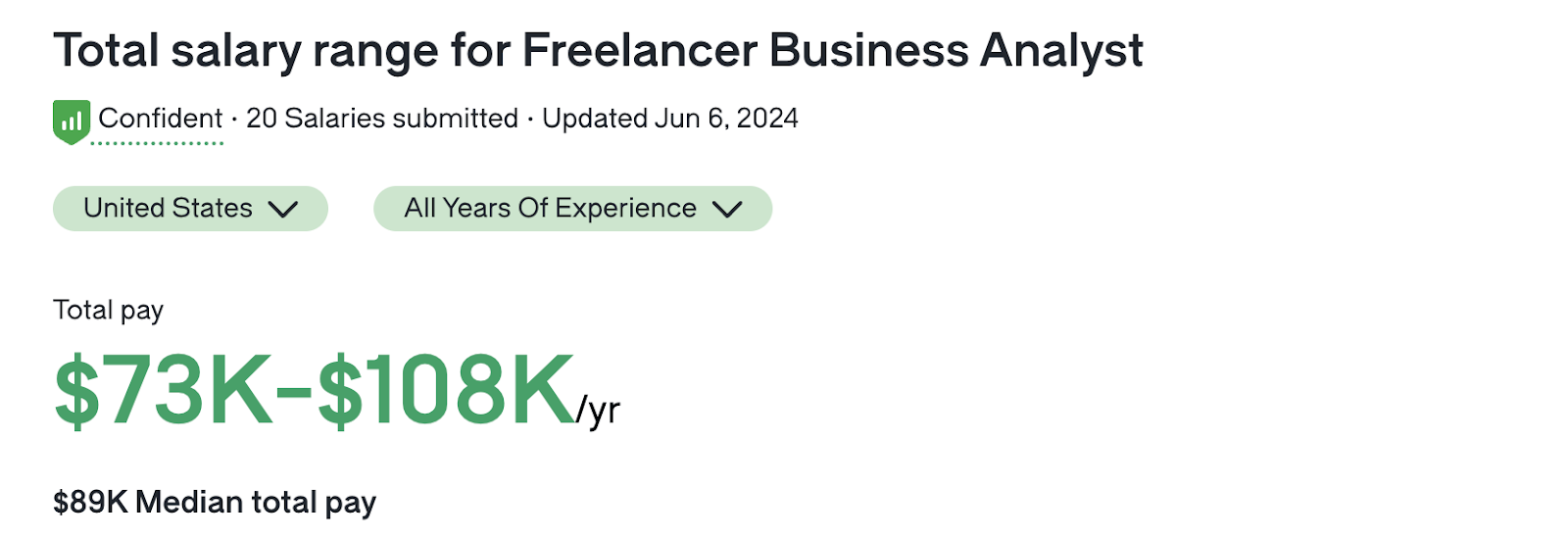
Fuente de la imagen: Glassdoor
En cualquier caso, es difícil ofrecer una estimación clara, ya que los ingresos de los analistas de negocios autónomos dependen en gran medida de factores como tus habilidades, experiencia y valoraciones.
Salarios de los analistas de negocios en distintos sectores
Los datos de PayScale y Zippia coinciden en indicar que el sector financiero ofrece algunos de los salarios iniciales más altos. Para las empresas tecnológicas y manufactureras, el salario mínimo (anual) de los analistas de negocios se estimó entre 58 000 y 55 000 dólares, respectivamente.
Atención sanitaria: Salarios medios de los analistas de negocios
Podemos ver que, en el sector sanitario, los analistas de negocios ganan alrededor de 86 000 dólares al año en Estados Unidos.
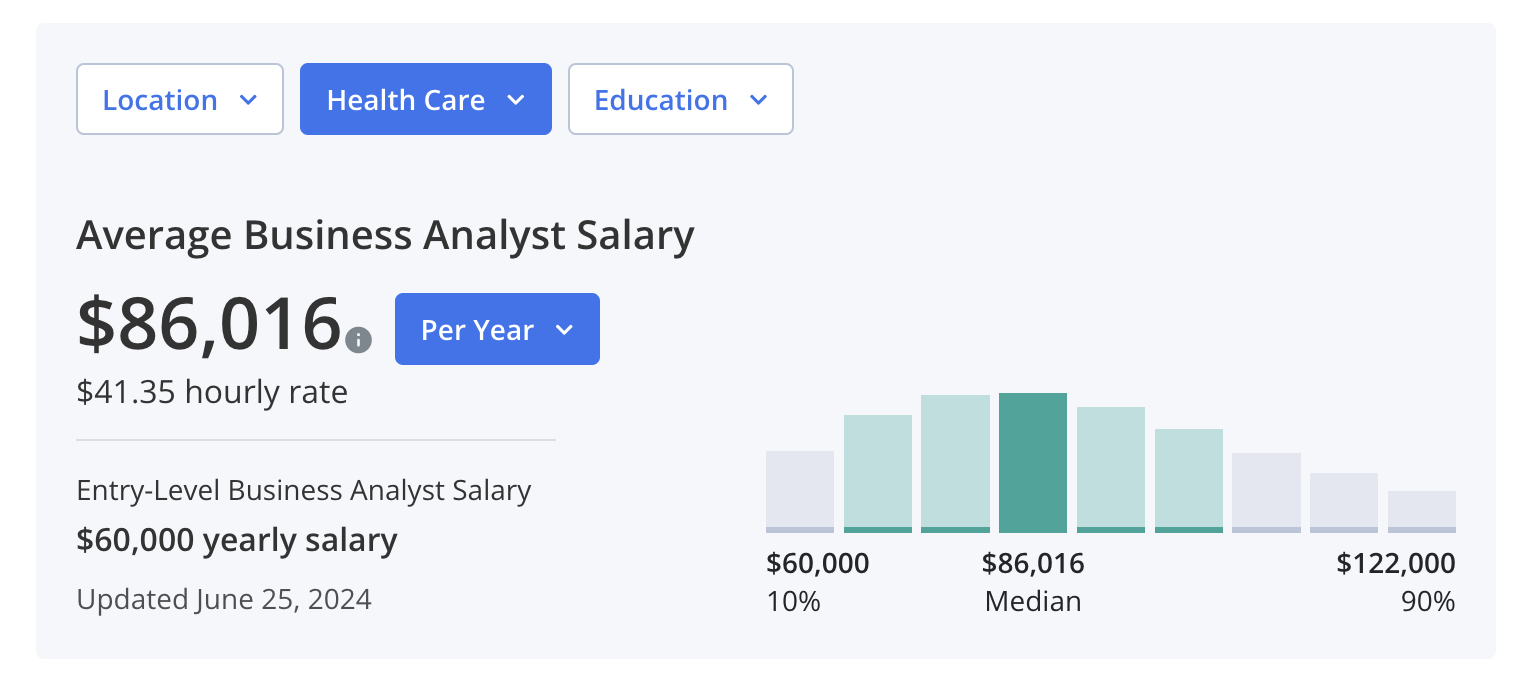
Fuente de la imagen: Zippia
Finanzas: Salarios medios de los analistas de negocios
Los analistas de negocios que trabajan en el sector financiero pueden esperar ganar un salario medio de alrededor de 91 000 dólares en Estados Unidos.
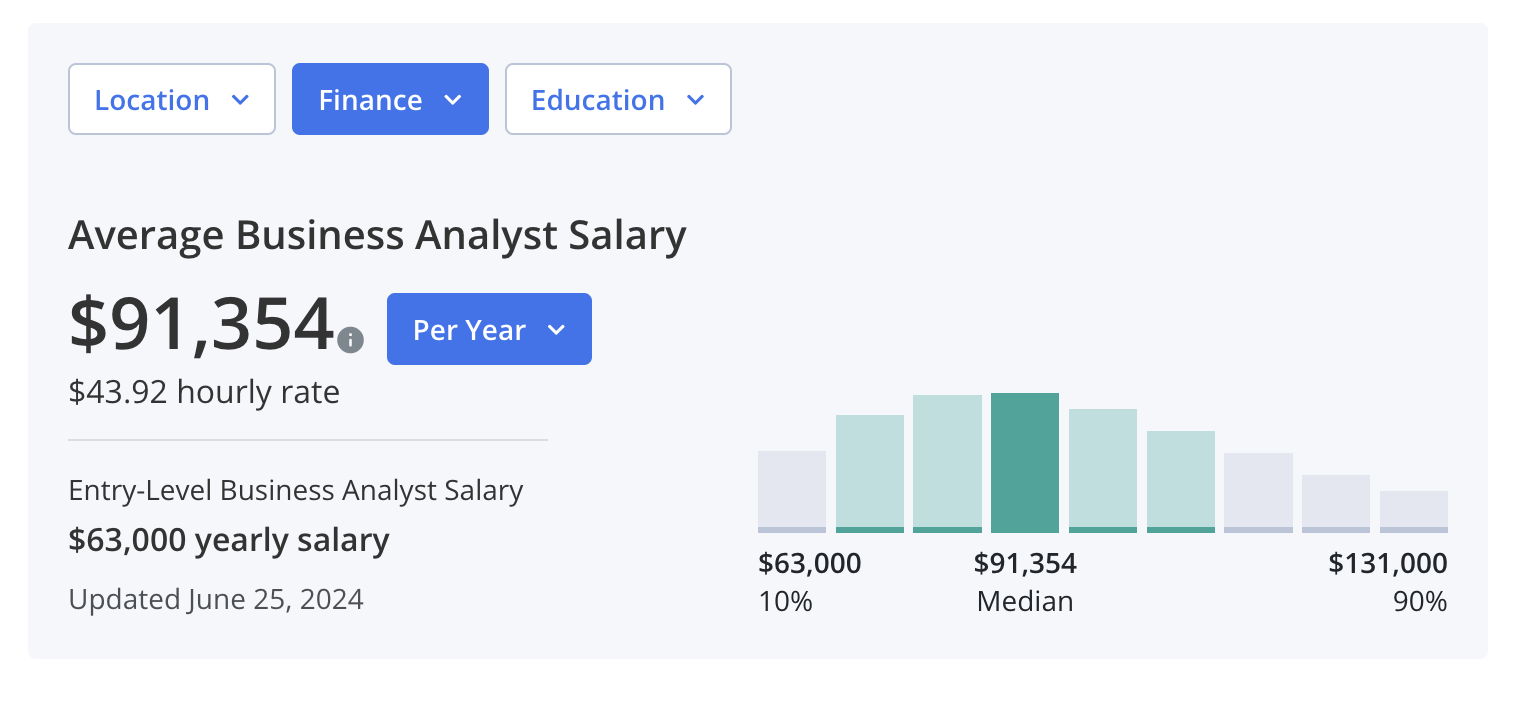
Fuente de la imagen: Zippia
Fabricación: Salarios medios de los analistas de negocios
Para los analistas de negocios en la industria manufacturera, el salario medio ronda los 85 000 dólares en Estados Unidos.
Fuente de la imagen: Zippia
Tecnología: Salarios medios de los analistas de negocios
Como era de esperar, quienes trabajan en el sector tecnológico tienen un salario bastante alto, y los analistas de negocios ganan alrededor de 85 000 dólares de media.
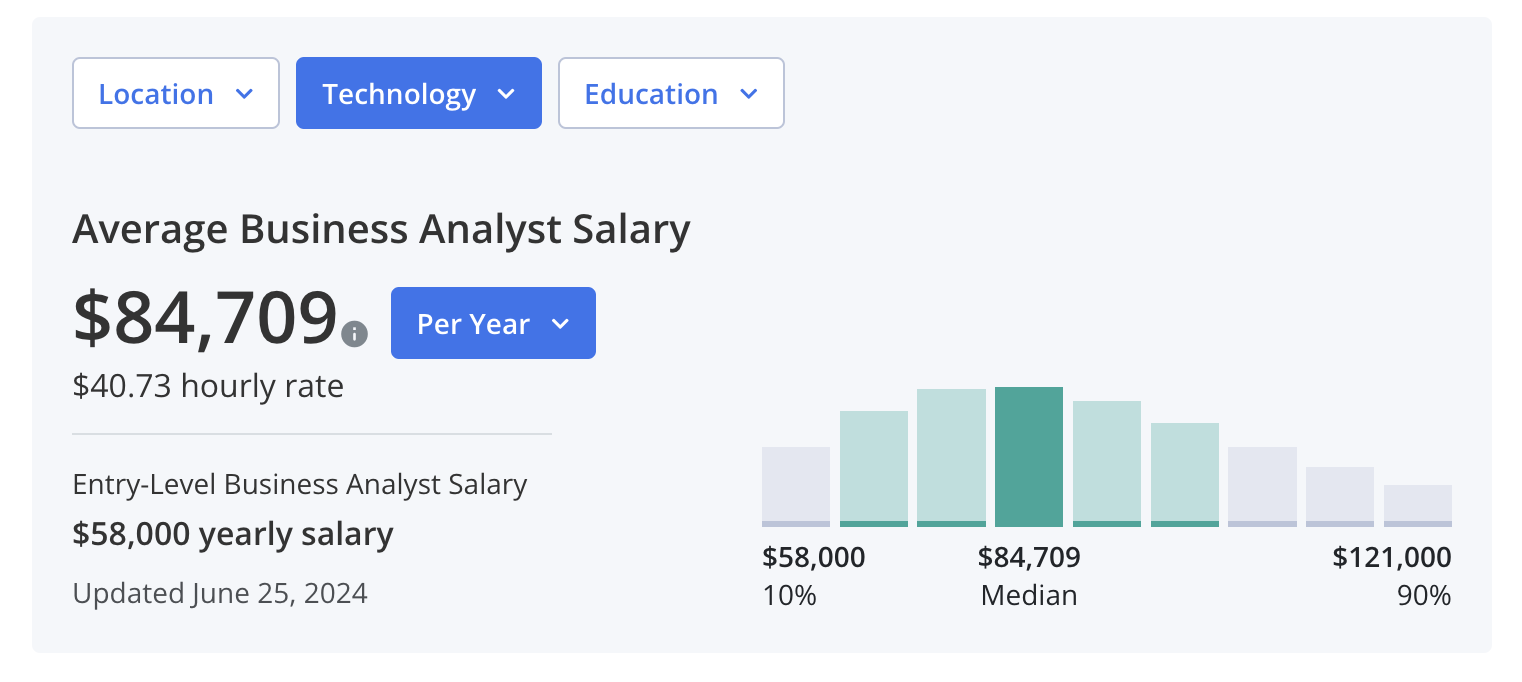
Fuente de la imagen: Zippia
Seguro: Salarios medios de los analistas de negocios
El sector de los seguros paga a los analistas de negocios algo más de 78 000 dólares de media.
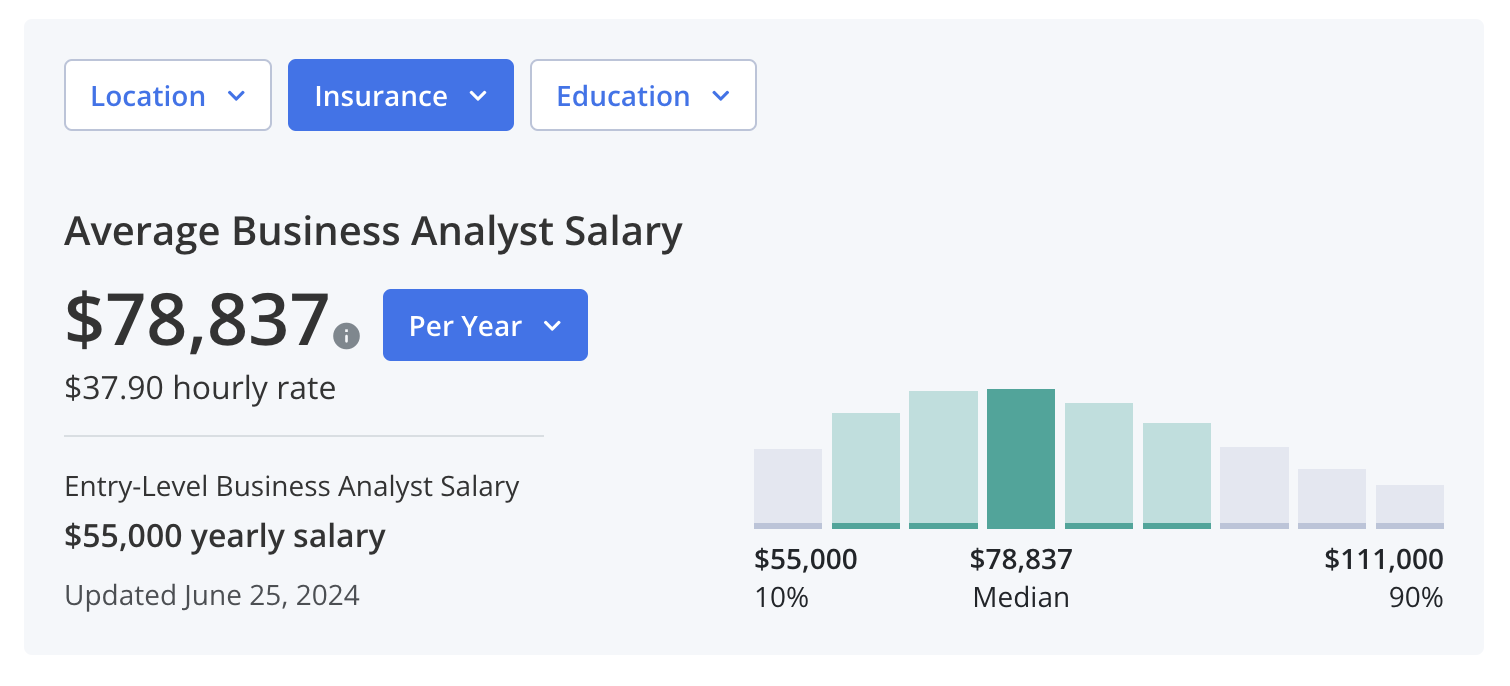
Fuente de la imagen: Zippia
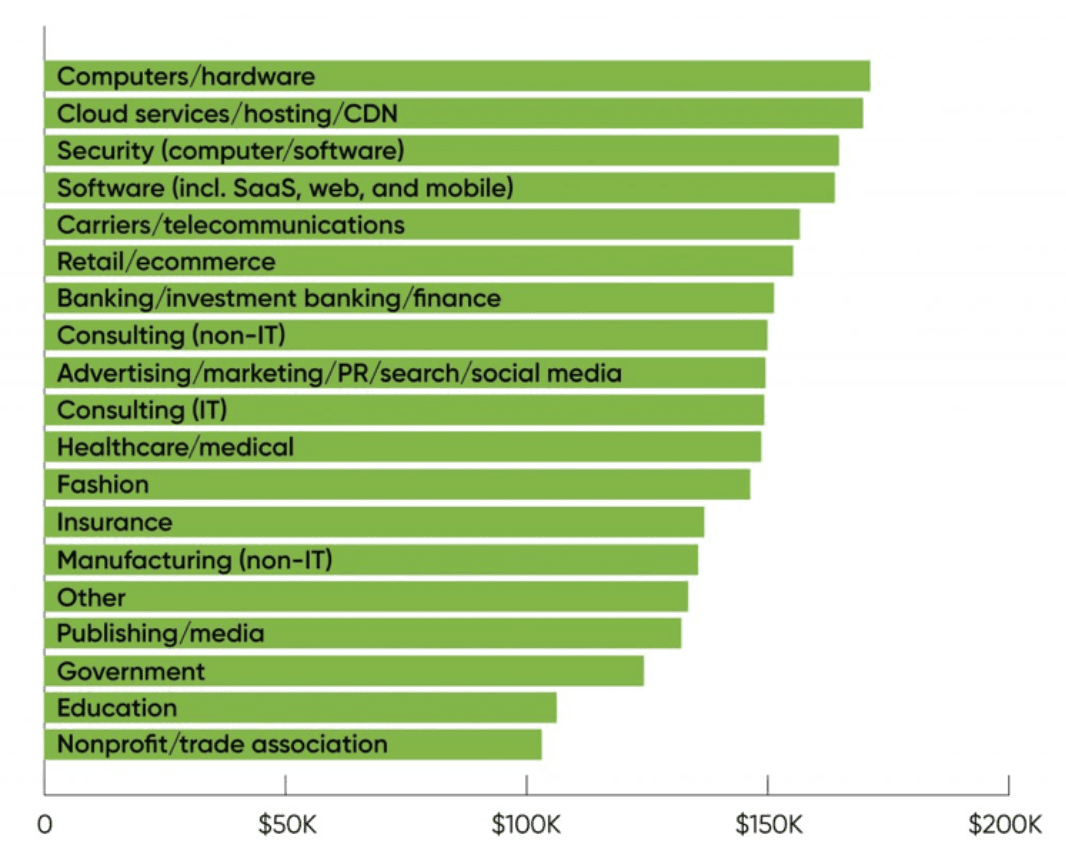
Fuente de la imagen: Escala salarial
En general, los profesionales de datos que trabajan en la industria informática (por ejemplo, hardware informático, servicios de nube, ciberseguridad o desarrollo de software) declararon los salarios más altos, con remuneraciones medias que oscilan entre los 171 000 dólares (para el hardware informático) y los 164 000 dólares (para el software). Los datos también muestran salarios muy competitivos (más de 100 000 dólares) en sectores ajenos a la informática, como la banca, el comercio minorista, la moda y los seguros. Esto concuerda con los últimos datos sobre ocupación publicados por los Estados Unidos. Oficina de Estadísticas Laborales.
Salarios de los analistas de negocios según sus habilidades
Dado que los analistas de negocios desempeñan muchas funciones, es importante contar con una amplia gama de habilidades técnicas y sociales. El equilibrio entre la perspicacia empresarial y los conocimientos tecnológicos variará según los puestos de trabajo y las empresas. Sin embargo, algunas habilidades muy valiosas pueden aumentar tu potencial de ingresos.
Las habilidades en análisis empresarial, análisis de requisitos, gestión de proyectos y análisis de datos se correlacionan con salarios superiores a la media.
Los datos de PayScale revelan cómo ciertas habilidades específicas pueden afectar directamente a tu salario como analista de negocios, especialmente en lo que respecta a las habilidades tecnológicas. Por ejemplo, la experiencia con Oracle eBusiness Suite puede aumentar tu salario en un 43 %.

Fuente de la imagen: Escala salarial
Qué puedes hacer para aumentar tu salario como analista de negocios
Como se ha comentado a lo largo de esta guía, los analistas de negocios son responsables de muchas tareas y, como tales, requieren diversas habilidades, tanto técnicas como interpersonales.
Teniendo en cuenta el panorama digital en constante evolución, es fundamental que los analistas de negocios sigan aumentando sus habilidades para adaptarse a las demandas del sector. Teniendo esto en cuenta, la formación continua es fundamental para los profesionales de los datos, no solo para mantenerse al día con el ritmo de la innovación y conseguir aumentos salariales o ascensos.
Considera cómo aumentar tu salario con estos consejos:
Títulos avanzados
Obtener un máster o un doctorado en ciencia de datos o materias relacionadas puede mejorar tus posibilidades de ascenso dentro de tu organización. La mayoría de las grandes empresas tecnológicas animan a sus empleados a participar en este tipo de programas.
Mejora tus habilidades con cursos
Utiliza plataformas como DataCamp para mejorar tus conocimientos de lenguajes de programación y mucho más. No pierdas la oportunidad de explorar nuestro amplio catálogo de cursos o inscríbete en uno de nuestros programas de formación para ampliar tus áreas de especialización.
Obtener certificaciones
Obtener una certificación es una de las formas más rápidas de adquirir o mejorar nuevas habilidades como analista de negocios. Según la encuesta salarial sobre datos e inteligencia artificial de O'Reilly, las certificaciones en nube, concretamente en AWS y Microsoft Azure, eran las que más se asociaban con aumentos salariales.
DataCamp ofrece una certificación completa de analista de datos que sin duda es relevante, y también puedes obtener la certificación de profesional de la nube de AWS o la certificación de fundamentos de Azure.
Si eres analista de negocios, considera también las certificaciones específicas para este campo, como la Certificación de Competencia en Análisis de Negocios (CCBA) del IIBA o la Certificación Profesional en Análisis de Negocios (CBAP) del IIBA, si tienes más experiencia como analista de negocios. Puedes leer más sobre las mejores certificaciones de analista de negocios en un artículo aparte.
Gestión de la experiencia
Busca oportunidades para asumir funciones directivas o de liderazgo en tu trabajo. Por ejemplo, si supervisas a analistas de negocios con menos experiencia, esta experiencia valida tu pericia y antigüedad, lo que puede aumentar las probabilidades de ganar más.
Cambio de empleador
Considera la posibilidad de cambiar de trabajo y pasar a una nueva empresa que esté dispuesta a pagarte más por tus habilidades.
Reubicar
Una de las medidas más drásticas, pero que sin duda tendrá un efecto espectacular, es trasladarse a una zona en la que la remuneración de los analistas de negocios sea mucho más alta.
Explora diferentes sectores
Como hemos visto, el salario de un licenciado en Administración de Empresas puede variar de un sector a otro. Considera la posibilidad de transferir tus habilidades y experiencia a un sector que pueda ofrecerte más recompensas.
Tendencias futuras en los salarios de los analistas de negocios
El informe LinkedIn 2025 sobre habilidades en auge destacó la creciente demanda de todo tipo de habilidades digitales y analíticas, sin signos de ralentización. El informe prevé que en los próximos cinco años se crearán 150 millones de puestos de trabajo relacionados con la tecnología en todo el mundo. Emsi Burning Glass prevé que los puestos de analista de negocios, en particular, crecerán un 5,9 % en los próximos 10 años.
Durante la pandemia, las inversiones en datos y análisis aumentaron debido a la dependencia de los datos y del mundo digital. Según un estudio de EY, el 93 % de las empresas indicaron que tienen previsto seguir aumentando las inversiones en el ámbito de los datos y el análisis. Según un informe de 2021 de Allied Market Research, el mercado del big data y el análisis de datos se valoró en más de 198 080 millones de dólares en 2020 y se espera que crezca hasta alcanzar los 684 120 millones de dólares en 2030.
A medida que el mercado crece, también lo hace la inversión en análisis de datos y, por lo tanto, aumenta la demanda de profesionales de BA. La competencia para contratar analistas de negocios se intensificará entre las empresas, lo que las obligará a incentivar a los candidatos con mejores salarios.
Cómo empezar como analista de negocios
Si estás pensando en iniciar tu carrera como analista de negocios, DataCamp es el mejor lugar para empezar. Echa un vistazo a nuestro seminario web sobre cómo convertirte en analista de negocios y comienza hoy mismo tu proceso de aprendizaje. Aquí tienes algunos recursos para empezar:
- Las habilidades más importantes para los analistas de negocios en 2026
- Cómo convertirse en analista de inteligencia empresarial blog
- SQL para analistas de negocios: programa formativo
- Las 6 mejores certificaciones de analista de negocios para 2026
¿Te interesan otros puestos? Echa un vistazo a nuestros otros artículos:
¿Estás listo para desempeñar una nueva función como analista de negocios?
Echa un vistazo a DataCamp Jobs, nuestra plataforma gratuita de empleo específica para profesionales de los datos.
Preguntas frecuentes
¿Qué formación académica se suele requerir para convertirse en analista de negocios?
La mayoría de los analistas de negocios tienen una licenciatura en campos como administración de empresas, finanzas, informática o áreas relacionadas. Los títulos o certificaciones avanzados, como un MBA o certificaciones como CBAP (Certified Business Analysis Professional), pueden mejorar las perspectivas laborales y el potencial de ingresos.
¿En qué se diferencia el papel de un analista de negocios según el sector?
Las responsabilidades principales de un analista de negocios siguen siendo similares, pero las tareas específicas pueden variar según el sector. Por ejemplo, en finanzas, un analista de negocios puede centrarse más en la modelización financiera y el análisis de riesgos, mientras que en TI puede trabajar en el desarrollo de software y la integración de sistemas.
¿Cuáles son algunas trayectorias profesionales habituales para los analistas de negocios?
Los analistas de negocios pueden ascender a puestos como analista de negocios sénior, gestor de proyectos, gestor de productos, analista de datos o consultor de gestión. Con experiencia, también pueden ascender a puestos ejecutivos como director de datos (CDO) o director de información (CIO).
¿Cuáles son las certificaciones más valiosas que pueden obtener los analistas de negocios?
Algunas certificaciones valiosas son CBAP (Profesional Certificado en Análisis de Negocios), PMI-PBA (Profesional en Análisis de Negocios), IIBA-AAC (Certificación en Análisis Ágil) y certificaciones en herramientas específicas como Tableau o SQL.
¿Qué impacto tiene el teletrabajo en los salarios y las oportunidades laborales de los analistas de negocios?
El trabajo remoto puede ampliar las oportunidades laborales y permitir a los analistas de negocios trabajar para empresas en regiones con salarios más altos sin tener que trasladarse. Sin embargo, también puede dar lugar a una mayor competencia por los puestos de trabajo, ya que los empleadores tienen acceso a una reserva de talento global.
¿Existen herramientas de software o plataformas específicas que los analistas de negocios deban dominar?
Los analistas de negocios deben dominar herramientas como Microsoft Excel, SQL, Tableau, Power BI, Jira y software de gestión de proyectos como Asana o Trello. También puede ser útil estar familiarizado con lenguajes de programación como Python o R.